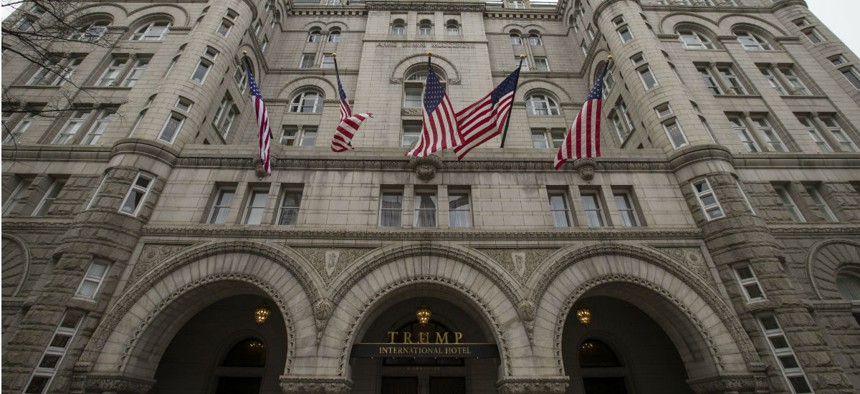Watchdog: GSA Ignored Ethics Advice on Constitutionality of Trump Hotel Lease
Inspector general blasts “unwillingness” to consider Emoluments Clause violations.
Eighteen months after announcing its probe of agency handling of President Trump’s controversial lease of a downtown federal building for his Washington luxury hotel, the inspector general of the General Services Administration on Wednesday released a tough critique of the process used to approve the unprecedented business arrangement.
The IG’s review of the contracting process for handling the complex conflict-of-interest question that has prompted lawsuits and revisiting of the two-century-old foreign and domestic Emoluments Clauses of the Constitution found “serious shortcomings,” the redacted report said.
“We found that GSA recognized that the president’s business interest in the [Old Post Office] lease raised issues under the Constitution’s Emoluments Clauses that might cause a breach of the lease,” IG Carol Ochoa wrote. “However, GSA decided not to address those issues in connection with the management of the lease. We also found that the decision to exclude the emoluments issues from GSA’s consideration of the lease was improper because GSA, like all government agencies, has an obligation to uphold and enforce the Constitution; and because the lease, itself, requires that consideration.”
After conducting two dozen interviews of GSA attorneys and contracting officers and reviewing 10,000 documents, the watchdog found that “GSA’s unwillingness to address the constitutional issues affected its analysis” of the sections of GSA’s lease with the Trump Organization “that led to GSA’s conclusion that [the] tenant’s business structure satisfied the terms and conditions of the lease. As a result, GSA foreclosed an early resolution of these issues, including a possible solution satisfactory to all parties; and the uncertainty over the lease remains unresolved.”
Had the process been proper, the IG argued, GSA would have paid more attention to ethics advisories available through both the “binding” precedents cited by the Justice Department’s Office of Legal Counsel and the more general guidance laid out by the Office of Government Ethics.
Investigators began by examining the internal GSA discussions shortly after Trump won the November 2016 election. They spoke to the players involved in the March 2017 decision (before the confirmation of current GSA chief Emily Murphy) to allow Trump to maintain the lease as both, in effect, tenant and landlord—a possible violation of the Constitution’s prohibition on elected officials’ accepting gifts from foreign government officials who, in this modern case, may stay in the hotel.
The GSA officials included GSA lease contracting officer, Kevin Terry; the GSA lease project manager, Brett Banks; GSA Deputy General Counsel Lennard Loewentritt; GSA Office of General Counsel attorneys Associate General Counsel for Real Property Barry Segal and Deputy Associate General Counsel for Real Property Timothy Tozer; former OGC Regional Counsel Paula DeMuth; and Public Buildings Service Deputy Commissioner Michael Gelber.
To remedy the situation, the IG recommended that the GSA general counsel “revisit the issue of potential breach” at the Old Post Office federal property and reexamine the language related to the Emoluments Clauses in other GSA leases.
GSA agreed, but in a letter, General Counsel Jack St. John noted that the probe “did not find that any Constitutional violation occurred.” He added that the agency was “gratified to learn” that the IG uncovered “not a single instance in which a political appointee or career federal employee at GSA attempted to interfere with or exert pressure on the contracting officer’s decision-making process.”
Rep. Elijah Cummings, D-Md., the newly installed chairman of the House Oversight and Reform Committee who has long sought more detail on GSA’s handling of Trump’s Washington hotel lease, hailed the report as a “scathing” vindication of his criticism.
“President Trump should not have any contracts with the federal government,” Cummings said in a Wednesday statement. “It is an obvious conflict of interest, and it is why the lease for the Trump Hotel in Washington, D.C., explicitly prohibits any federal government official from being a party. This devastating new report from the inspector general is proof that President Trump should have divested his business interests rather than ignoring the advice of ethics experts.”
The Trump Hotel, Cummings added, “is a glaring physical symbol of the Trump administration’s refusal to play by the same rules as everyone else.”
Sign up for GovExec newsletters and alerts and download our app to stay informed.
NEXT STORY: The Citizenship Question Isn’t Quite Dead Yet




